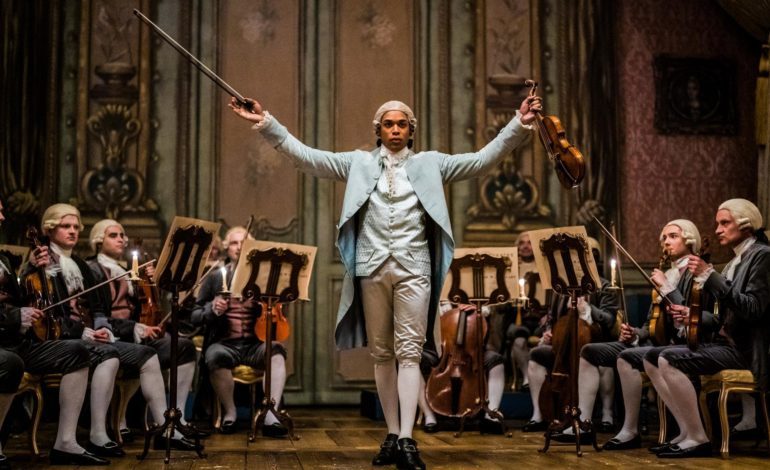

We’ve observed riff-offs in films like Pitch Perfect, but Chevalier’s opening moments are the classical music equivalent. Wolfgang Amadeus Mozart (Joseph Prowen) is performing
a concert in Paris, firmly to the audience’s delight, once a voice from the crowd requests that he join him on stage. Mozart, ever the showman, consents, only to be surprised when the boastful violinist is Joseph Bologne (Kelvin Harrison Jr.), a Black violinist. Any assumptions Mozart has about Joseph’s talents are quickly dispelled as he outperforms Mozart and wins over the audience. In today’s world, Joseph would drop the mic as he stepped off the stage.
This is where we meet Joseph Bologne, a real-life master, and composer who, according to the film, is the cultural equivalent of a rock star during the French Revolution. It’s an effective opening that focuses the movie on Harrison and classical music, attracting audiences with a protagonist they may not be familiar with and a style of music that isn’t precisely chart-topping. This, along with the lesson of choice and understanding your worth even when others look down upon you, makes Chevalier a worthwhile watch. However, it also overpowers other aspects that could have elevated the story.
If you’re unfamiliar with Kelvin Harrison Jr., he’s a rising star. Before Chevalier, he received praise for his roles in indie films Luce and Waves and supporting roles in films such as Elvis and Godfather of Harlem. He can shine as the leader here and certainly does not disappoint. He offers Joseph a radiant confidence, even though he carries a chip on his shoulder, a fact that renders it all the more powerful when his life falls apart as his believed friends fail to stand by him, exposing their true colors about his race.
It’s a historical drama from the 18th century; therefore, we can all expect a dramatic shift. While director Stephen Williams and writer Stefani Robinson do not rewrite the formula with Chevalier, it is an imaginative tale brought to life in an immersing and effective manner.
This involves the delivery of its message. Not-so-subtle clues are thrown in throughout, but it all comes together in a speech delivered by Joseph’s mother, Nanon (Ronke Adekoluejo): the world that Joseph exists in has been orchestrated against him, but the one thing nobody can take away is his own choice to battle that injustice.
The French Revolution parallels that and Joseph’s story, but the film never adequately connected that historical event to its own. There is some discussion of emotions regarding the French monarchy, mainly Marie Antoinette, and the developing ideas of revolution. Still, the moment is never big enough. Even Joseph’s final concert, held in favor of the French people in opposition to Antoinette’s wishes, fails to live up to the historical moment, emphasizing Joseph’s triumph.
The positive aspect for Chevalier is that the film isn’t about the French Revolution; it’s about Joseph, so ignoring the French Revolution isn’t a major flaw; it only might have given the film a more epic feel. Like the beginning, the final scenes verify Joseph’s status as a musical genius and a star and will send you out on a high note.
A quick note: Oliver Garcia’s costume design is stunning, and the supporting ladies of the film — Adekoluejo, Samara Weaving, and Lucy Boynton — all offer strong performances.
Score: 3 out of 5
Chevalier is the Kelvin Harrison Jr. show, and he plays it like a piece of music. He breathes new life into the story and work of a musician who lived almost three hundred years ago. In a nutshell, Chevalier is the kind of well-crafted mature drama we wish there were more of. It may not go as significant during the finale as it could have but watch it, and you’ll be captivated by the acting, story, and of course, the music.
